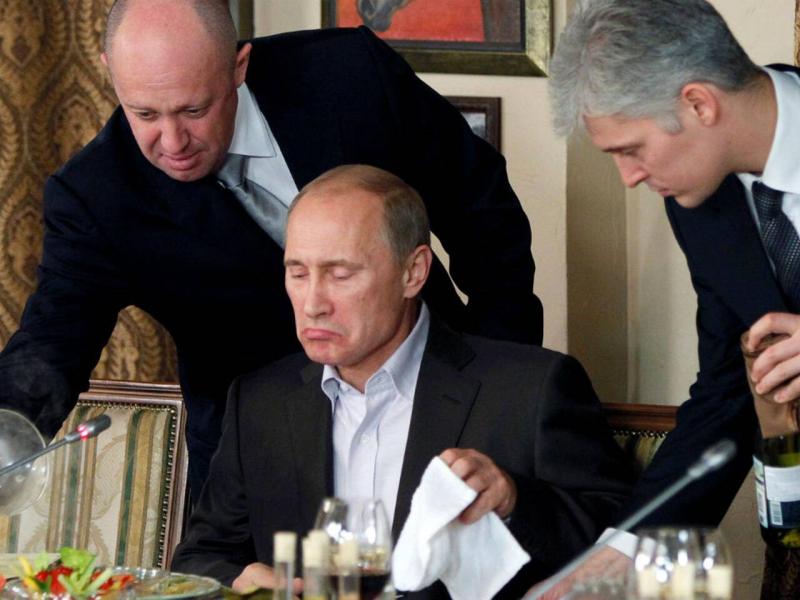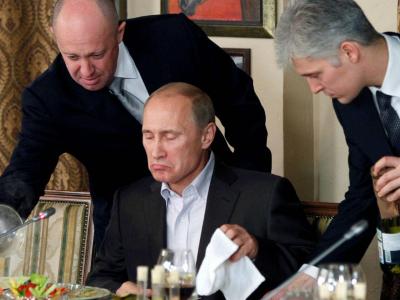Last night, the 62-year-old leader of the Russian Wagner Group surprised the Russian army by calling on his men to fight against their commanders, an act deemed an unacceptable rebellion in Moscow.
Who is this controversial man? His name first emerged during the peak of Russia's initial covert invasion of eastern Ukraine in the summer of 2014 when a group of senior Russian officials gathered at the Ministry of Defense, a grand building from Stalin's era on the banks of the Moscow River. They had come to meet Evgeny Prigozhin, a middle-aged man with a shaved head and a rough voice, who was responsible for army supply contracts. He made a strange request from the Ministry of Defense, asking to be granted land to train "volunteers" who had no official ties to the Russian army but could be used to fight Russia's wars.
At that time, many of the present leaders were not fond of the request, but Prigozhin was adamant, claiming it was an order from the "Pope," a reference to Russian President Vladimir Putin, as confirmed by a former high-ranking official in the Russian Ministry of Defense who was directly informed about those discussions, according to the Guardian. Since that meeting, the Wagner Group's capabilities expanded, and its fighters infiltrated foreign battlefields, recently reaching the fronts in Ukraine. Prigozhin also gained wide notoriety among army leaders, although he was not always liked.
A Russian businessman who has known him since the 1990s described him as "vital and active and talented, but also stubborn and never backtracks until he gets what he wants." However, those who fought alongside him in Ukraine or other countries described him as brutal and merciless! Some of his acquaintances confirmed that he was not driven by money or power, despite having gained both over his career. Instead, they clarified that he was motivated by excitement and the belief that he was fighting corrupt elites on behalf of ordinary people, along with a desire to crush his rivals. Over the years, he gained numerous enemies, including businessmen and former partners, as well as army generals whom he repeatedly criticized as bureaucrats sitting in their offices and top security officials who feared he had ambitions to seize political power. Until yesterday, he had retained the protection of his most important supporter, the "man he calls Papa." However, "Papa Putin" has now abandoned him after he declared his insubordination, exposing a "dark history!"
Prigozhin, born in Leningrad (Saint Petersburg) in 1961, nine years after Putin, lost his father at a young age and became a "troublesome" kid. He joined a crowd of small-time criminals. Court documents from 1981 confirmed that in March 1980, when Prigozhin was 18 years old, he robbed a woman along with his accomplices on the streets of Petersburg. He would later commit further robberies over several months, leading to a 13-year prison sentence. Released in 1990 as the Soviet Union began to collapse, he returned to Saint Petersburg, a city on the verge of a massive transformation, with great fortunes awaiting those clever or ruthless enough to seize them. The man started selling sausages from a kitchen in his family's modest apartment.
However, his ambitions were much greater, and he knew how to achieve them. It didn't take long for Prigozhin to own a stake in a chain of supermarkets. Then in 1995, he decided to open a restaurant with his business partners. Initially, he used "dancers and entertainers" to lure customers, but after word spread that the food was excellent, the entertainers were dismissed. Pop stars and businessmen flocked to the restaurant, as did Saint Petersburg’s mayor, Anatoly Sobchak, who sometimes came with his deputy at the time, Vladimir Putin! He also befriended the famous cellist Mstislav Rostropovich, who emigrated from the Soviet Union in the 1970s. When Rostropovich hosted the Queen of Spain in his home in Saint Petersburg in 2001, Prigozhin provided the food. Even Rostropovich invited Prigozhin and his wife to a concert at the Barbican, celebrating his 75th birthday in 2002, according to the London Symphony Orchestra's invitation records for the event.
By that time, Putin had already become the President of Russia. During his early years in power, the Russian president often enjoyed meeting distinguished foreign personalities in his hometown. Sometimes he would take them to Prigozhin’s restaurant or to New Island, where Prigozhin had transformed a boat into a floating restaurant. Since then, Prigozhin began winning catering contracts for major government events through Concord, a holding company he established in the 1990s. In 2012, he secured over 10.5 billion rubles (200 million pounds) in contracts to provide food for Moscow schools, according to Russian media reports citing records from the Russian financial register. After that, new opportunities arose for "Putin's cook" when Russia annexed Crimea in March 2014 and intervened militarily in eastern Ukraine shortly thereafter. While Putin denied that regular Russian forces were involved in either case, Wagner troops were in the field! Since then, the private military group led by Prigozhin has intervened militarily in many countries, especially in Africa, and recently arrived in Ukraine, where it disrupted Russian military ranks and showcased the "rebellion" of the sausage vendor!
Wagner captured the city of Bakhmut in eastern Ukraine last month after some of the bloodiest fighting of the war. However, Prigozhin, during the battle, violated the taboos of Putin's tightly controlled political system and began hurling obscenities at the military leadership in Moscow. He later published a video thanking the Kremlin, despite echoing his preferred complaint tone, claiming that the top military command was a group of traitors, specifically naming Russian Defense Minister Sergei Shoigu and Chief of General Staff Valery Gerasimov. In one of the most memorable videos of Prigozhin, released on May 5, he displayed a square filled with the bodies of Wagner fighters, whom he said had died due to a lack of ammunition, placing the blame on Shoigu and Gerasimov. The United States and the European Union imposed sanctions on Prigozhin due to his role in Wagner. He has also been accused of funding the Internet Research Agency, which Washington claims tried to influence U.S. elections.




